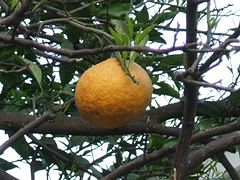Amanatsu
| Natsumikan / Amanatsu | |
|---|---|

| |
| Scientific classification | |
| Kingdom: | |
| (unranked): | |
| (unranked): | |
| (unranked): | |
| Order: | |
| Family: | |
| Genus: | |
| Species: | C. × natsudaidai
|
| Binomial name | |
| Citrus × natsudaidai | |
Amanatsu (甘夏) or natsumikan (ナツミカン(夏蜜柑)) is a yellowish orange citrus hybrid fruit, a group of cultivars of Citrus natsudaidai, which were discovered in 1740 in the Yamaguchi prefecture of Japan.
Names
In Japan, it is officially known as the kawano natsu daidai (カワノナツダイダイ(川野夏橙)), but also colloquially the amanatsu, amanatsu daidai (甘夏橙), amanatsukan (甘夏柑), and amanatsu mikan (甘夏蜜柑(甘夏みかん)).
Description
Natsumikan is about the size of grapefruit and oblate in shape. The fruit contains 12 segments and about 30 seeds. The rough textured fruit is easy to peel and is commonly eaten fresh. It is also used for wide variety of products ranging from marmalades to alcoholic beverages.
Cultivation
Natsumikan is grown commercially in Japan, notably in Yamaguchi, Kumamoto and Ehime prefecture. The city of Hagi is famous for its natsumikans, particularly when used in natsumikan juice and ice cream.
Yamaguchi Prefecture takes such pride in their natsumikan industry that the typically white crash barriers of Japan were changed to a befitting orange.
Genetics
The natsumikan tree is believed to be genetically derived from the pomelo (Citrus grandis or Citrus maxima).
Medicine
Researchers found that immature natsumikan peel is beneficial for the treatment of chronic allergic dermatitis in mice.[1]
Gallery
-
The large bearing tree.
-
Locally at Nagato, Yamaguchi.
-
At street side in Hagi, Yamaguchi.
-
Blossoms.
-
On tree.
-
Fruit.
See also
References
- ^ Nakayama, N; Yamaura, K; Shimada, M; Ueno, K (2011). "Extract from peel of Citrus natsudaidai alleviates experimental chronic allergic dermatitis in mice". Pharmacognosy Res. 3: 155–9. doi:10.4103/0974-8490.84999. PMC 3193614. PMID 22022162.
{{cite journal}}: CS1 maint: unflagged free DOI (link)







